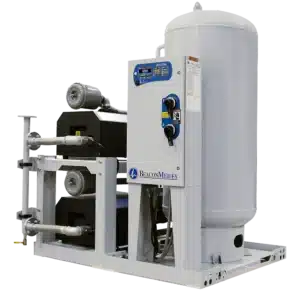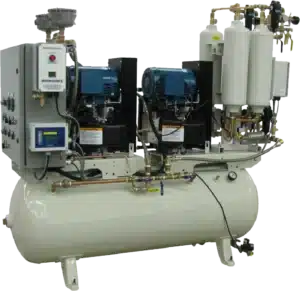A check valve basically works as an automatic safety device. Its design permits gases and fluids to flow in a single direction, thus preventing reverse flow. Fluids take entry into the valve when specific pressure is applied. It happens at the inlet where the disc gets out of the valve seat. It then exits through the inlet.
The flow remains consistent as long as the pressure is maintained. With the drop in the pressure, the disc returns to the seat (automatically) to completely halt the flow.
The pressure applied to open up the valve ranges between 3 to 350 psi depending on the check valve’s purpose, size, and function.
In the healthcare industry, numerous medical gas check valves with extensions are used. Use a credible supplier such as Medical Testing Solution to procure these devices.
Check valves can create tight seals to fight against leaks, along with ensuring that gases/liquids flow in the right direction. By doing so, they shield pumps and compressors from serious damage.
Check valve names vary according to their applications and the method used to manufacture them. Some of the names include:
- One-way valves
- Retention valves
- Reflux valves
- Non-return valves
- Clack valves
The primary function of check valves is to prevent the flow in the reverse direction. If that happens, this can have some serious negative impact on pumps and related mechanisms.
Check valves can get noisy during operations, which needs to be suppressed. For that, specialized controls must be implemented.
Check Valve Types
Swing Check Valves
It is a self-actuated valve that serves as a one-direction valve or backflow preventer. The disc present here swings on a hinge from the valve seat to facilitate forward flow. These valves can be highly effective in the likelihood of a water hammer.
Wafer Check Valves
The compact, short, and thin design of these valves make them ideal for complementing compact (small) pipe systems. These can also be used in systems where semi-solid or pure solid media needs to be transported.
Tilting Disc Check Valves
These are mostly used when there is frequent flow reversal. While the disc is set to open, the flow allows it to stay like that.
Ball Check Valves
Here, balls are used to block the flow that moves in upward and downward directions. The valve seat neatly fits the ball that comprises a conical-shaped chamber to direct the ball to the seat.
Butterfly
It has known by different names, such as split check valve, double disc, folding disc, and dual check valve. The advantage of using this is that it can operate silently, making it ideal for ACs, heating, and ventilation systems.
Some other types of check valves include lift check valves, silent check valves, duckbill valves, diaphragm check valves, foot check valves, and pneumatic check valves.
Advantages of Check Valves
- Prevent reverse flow.
- Ability to pass through high/low pressure conditions.
- Work as an efficient safety and backup system.
- Self-actuated and fast acting.
- Reduce downtime.
- Prevent production losses.
- Fight against water hammer.
- Low maintenance costs.
- Few moving components/parts.
- Work efficiently with variable flow conditions.
Choosing Medical Testing Solutions
We can offer you top-notch quality medical check valves that are individually packed and capped. In addition, each check valve assembly is degreased and washed for medical gas services according to the CGA G-4.1 standards.


